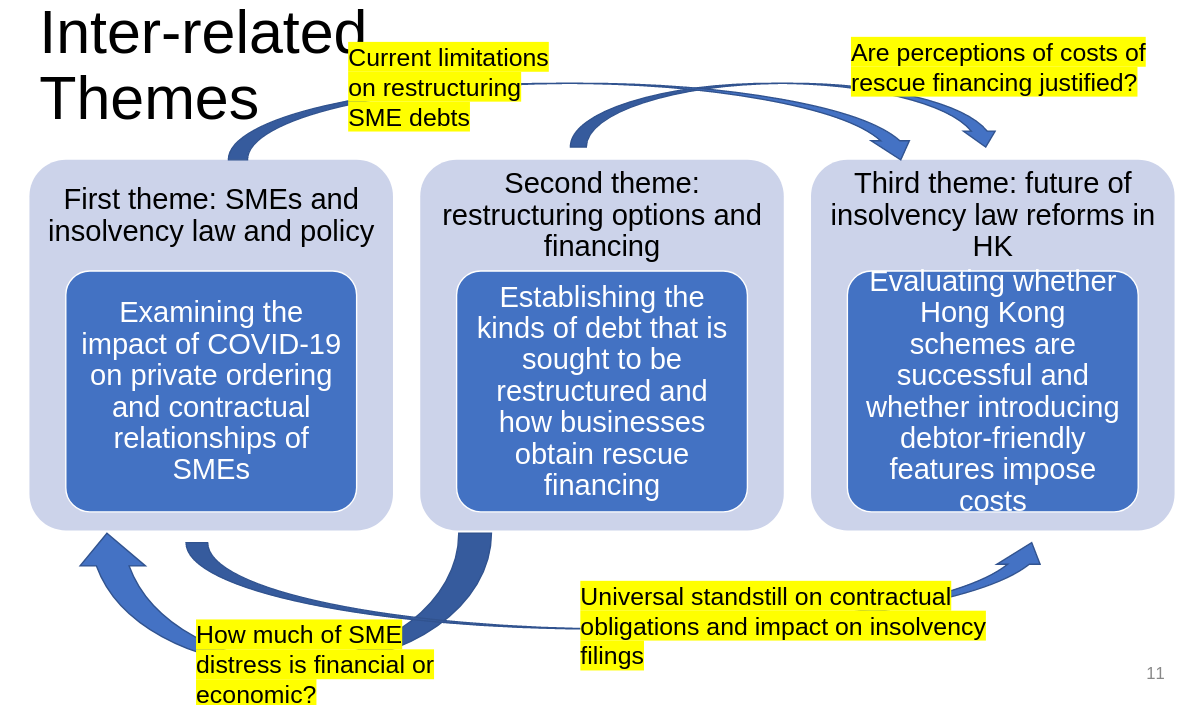Grant type
Principal investigator
Others Co-investigator
(Faculty of Law, HKU)
Prof. Gerard MCCORMACK
(School of Law, LEEDS)
Prof. MO Lai Lan Phyllis
(Department of Accountancy, CityU)
Mr Alwin CHAN
(Faculty of Law, HKU)
Prof. Kelvin LOW
(National University of Singapore)
Prof. LI, Linda Che-lan
(Department of Public Policy, CityU)
Prof. Susan BRIGHT
(Faculty of Law, OXFORD)
Assoc. Prof. QI Yaxuan
(Department of Economics and Finance, CityU)
Research Focus
With the onset of the COVID-19 pandemic, the number of insolvency filings by otherwise economically viable firms globally is expected to rise significantly. Hong Kong will not be an exception. The collapse of small and medium sized enterprises (SMEs) will have a serious impact in Hong Kong as SMEs account for 45% of the private sector total employment and 98% of all of the business establishments. The Government is proposing to enact legislative reforms to allow for provisional supervision and corporate rescue, which are out-of-court procedures, to facilitate restructuring if the major secured creditor consents.
Even if the reforms based on provisional supervision are enacted, the restructuring framework in Hong Kong remains very much creditor-driven and does not have the features of a debtor-driven restructuring regime. Hong Kong’s restructuring framework is found in the form of consensual workout, and a legislative framework in the Companies Ordinance, Cap 622 (HK) that comprises a scheme of arrangement (scheme), based on the English scheme, and provisional liquidation. While Hong Kong’s restructuring regime has served it well through the Asian financial crisis of 1997 and the global financial crisis of 2008, it cannot be assumed that it will work through the COVID-19 crisis.
The current regime faces three key limitations that were not present in the earlier crises: first, the scheme is geared towards restructuring of financial debt, similar to the scheme in the UK. It is not clear if schemes would be cost-effective to restructure financial and operational debt of large numbers of SMEs expected to be in default. Second, in times of crises, fresh financing is required and, unlike the earlier crises, there can be no expectation that SMEs can access fresh financing. Third, SMEs face special and urgent problems with respect to arrears in rental and performance of contractual obligations that are disrupted by COVID-19. Without special legislation or measures to constrain enforcement or impose a standstill for the leases and other contracts, there remains the concern that the leases will be terminated (thereby prematurely ending otherwise viable businesses in sectors such as retail) and/or courts will be overwhelmed with the litigation.
Finally, the COVID-19 crisis also raises the broader question as to the future of a creditor-driven insolvency law in Hong Kong, given the likely economic impact of the crisis on the SMEs and other larger firms. Our project gathers the necessary social data, bring comparative analysis that is contextualised to Hong Kong, and advance it.
Themes

Contact
Email: waiywan@cityu.edu.hk